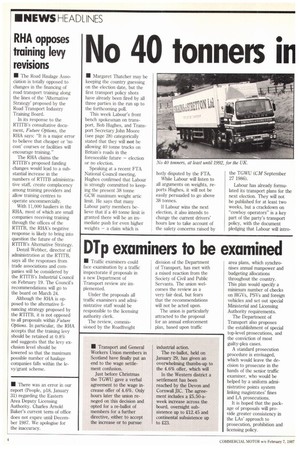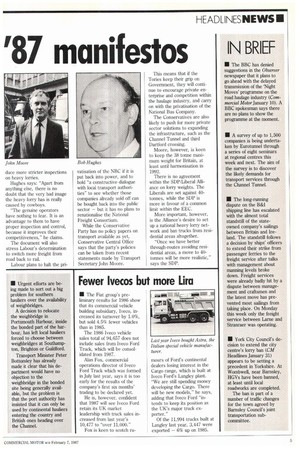No 40 tonners in
Page 6

Page 7

If you've noticed an error in this article please click here to report it so we can fix it.
'87 manifestos
• Margaret Thatcher may be keeping the country guessing on the election date, but the first transport policy shots have already been fired by all three parties in the run up to the forthcoming poll.
This week Labour's front bench spokesman on transport, Bob Hughes, and Transport Secretary John Moore (see page 28) categorically stated that they will not be allowing 40 tonne trucks on Britain's roads in the foreseeable future — election or no election.
Speaking at a recent FTA National Council meeting, Hughes confirmed that Labour is strongly committed to keeping the present 38 tonne GCW maximum weight artic limit. He says that many Labour party members believe that if a 40 tonne limit is granted there will be an immediate push for even higher weights — a claim which is hotly disputed by the ETA.
While Labour will listen to all arguments on weights, reports Hughes, it will not be easily persuaded to go above 38 tonnes.
If Labour wins the next election, it also intends to change the current drivers' hours law to take account of the safety concerns raised by
the TGWU (CM September 27 1986).
Labour has already formulated its transport plans for the next election. They will not be published for at least two weeks, but a crackdown on "cowboy operators" is a key part of the party's transport policy, with the document pledging that Labour will intro duce more stricter inspections on heavy lorries.
Hughes says: "Apart from anything else, there is no doubt that the very bad image the heavy lorry has is really caused by cowboys.
"The genuine operators have nothing to fear. It is an advantage to them to have proper inspection and control, because it improves their competitiveness," he claims.
The document will also stress Labour's determination to switch more freight from road back to rail.
Labour plans to halt the pri
vatisation of the NBC if it is put back into power, and to hold "a constructive dialogue with local transport authorities" to see whether those companies already sold off can be bought back into the public sector — but it has no plans to renationalise the National Freight Consortium.
While the Conservative Party has no policy papers on transport available as yet, Conservative Central Office says that the party's policies can be taken from recent statements made by Transport Secretary John Moore. This means that if the Tories keep their grip on Government, they will continue to encourage private enterprise and competition within the haulage industry, and carry on with the privatisation of the National Bus Company.
The Conservatives are also likely to push for more private sector solutions to expanding the infrastructure, such as the Channel Tunnel and third Dartford crossing.
Moore, however, is keen to keep the 38 tonne maximum weight for Britain, at least until harmonisation in 1992.
There is no agreement within the SDP/Liberal Alliance on lorry weights. The Liberals are set against 40tonnes, while the SDP is more in favour of a common limit within the EEC.
More important, however, is the Alliance's desire to set up a national heavy lorry network and ban trucks from residential areas altogether.
"Once we have better through-routes avoiding residential areas, a move to 40tonnes will be more realistic," says the SDP.












































































